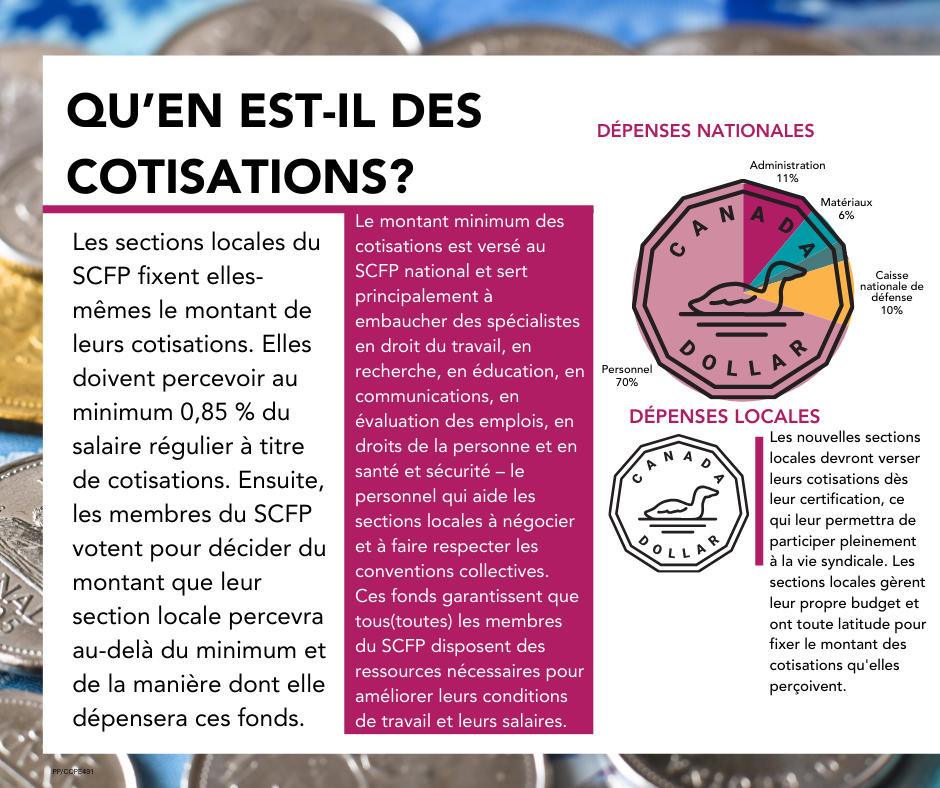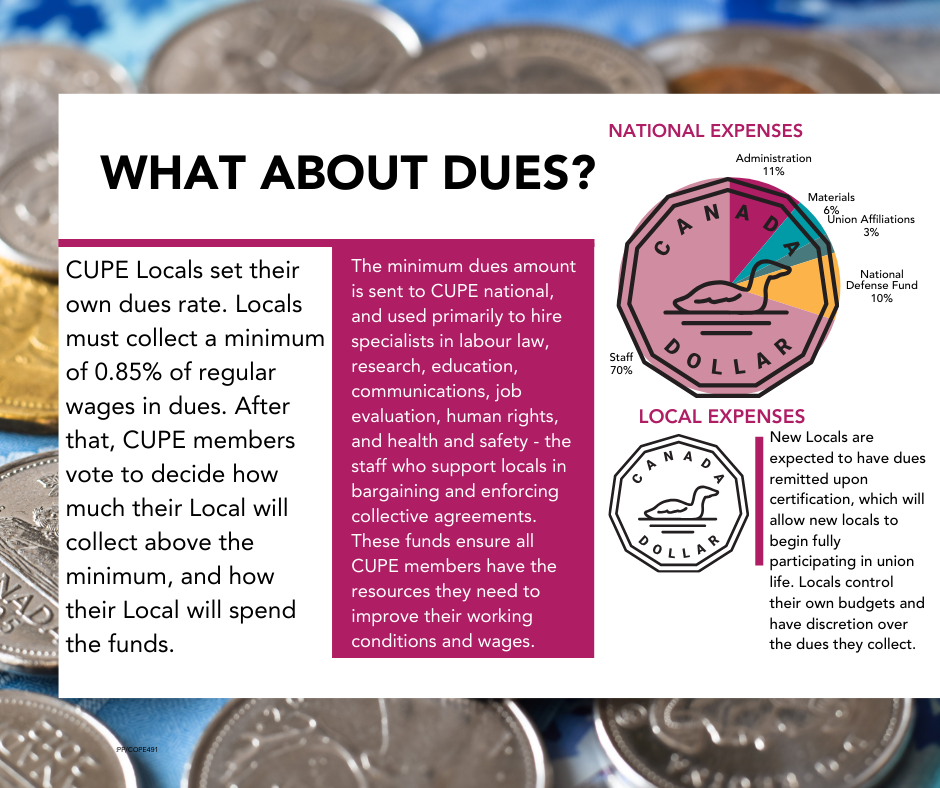When deciding which union to vote for, there are many points to consider. Here are some questions we encourage you to ask all the unions to ensure you get the best representation possible.
Dues — What You Pay
- How much are my dues, how are they calculated, and how does the Local access those funds?
At CUPE, our Locals have the autonomy to set their own dues structure. 0.85% is sent to the National Union to cover servicing and other resources, but the remainder stays with the Local for members to manage. Most CUPE Locals set their dues on average at 1.5%
- Where do my dues go, broken down in clear, concrete terms?
CUPE’s dues are broken into two streams – The National stream and the Local stream. National expenses are broken up in administration (11%), materials (6%), Union affiliations (3%), the National Defense fund (10%) and staffing (70%). Local expenses are established and managed by Local unions and their members. How you would manage this stream is up to you!
- How much of my dues are spent directly on representation, bargaining, and grievances versus administration and overhead?
The National stream and the Local stream. National expenses are broken up in administration (11%), materials (6%), Union affiliations (3%), the National Defense fund (10%) and staffing (70%). These are all covered by the 0.89% portion of dues remitted to the National Union, leaving the Locals with full access to their funds for other purposes.
- How do members see and approve financial decisions, including any future dues increases?
CUPE is a bottom-up, members first union, which means it’s rank and file members like you that make those decisions. Members vote on Local dues, and any changes to the National Dues remittance requires a vote at the biennial National Convention. CUPE members are always in control of their dues.
You can review CUPE National’s finances on cupe.ca
Grievances — How You Are Protected
- When I have a workplace issue, who helps me decide whether it’s a grievance?
CUPE is a servicing union, which means we have the skills and experience in representing our members. We have a robust structure for training Local shop stewards and have a full complement of National Servicing Representatives and lawyers ready to step in to support our members during grievances.
- Who writes the grievance and who represents me at the first meeting with the employer?
At the first meeting with the employer, your Local shop steward or Local executive is already on the ground to support you. National Servicing reps can also be tapped in to help support you.
- What support do I, as a grievor have as my grievance moves through the process, including arbitration?
The union provides servicing representatives, lawyers, human rights representatives, health and safety experts, and communications reps to support you through the grievance process. With CUPE, you know you have experienced, expert staff at your back every step of the way. At CUPE the Local holds “carriage” of the grievance. This means your Local ensure that grievances move forward. Some Locals have grievance committees who review grievances and appeals that members might make on their grievances. Your Local has the support of national staff and legal experts throughout this process. Your Local will help ensure that members are represented and also ensure that a grievance will positively affect the greater membership. It’s important that your elected representatives review the grievances to make sure that a grievance by ONE individual does not negatively impact the entire membership.
- How does the Union handle health and safety matters at work?
CUPE has dedicated Health and Safety experts that can be tapped in to help assess and prescribe remedies for the workplace. Our Health and Safety officers are leaders in their field, with other unions often deferring to us on health and safety matters on Local, provincial, and national levels.
Structure — Who Holds the Power
- How is the Union structured from the workplace to the provincial and national levels?
CUPE is a member-led, bottom-up structure. Members have direct control of their Locals, electing representatives from within their membership to administer their Local, and sit on committee at regional and national levels. CUPE members are always in control of their Local affairs, and your voice is always part of the discussion in forming new policy for the Union at higher levels.
- Where does decision-making power sit: with members, elected leaders, or staff?
Members are the heart and soul of CUPE. All decisions come back to them. You elect your Local leaders; you set your priorities for bargaining and decisions are made through democratic votes.
- Are decisions made locally or centrally?
At CUPE, Local Unions have autonomy to manage their own affairs, make their own decisions, and ensure that members voices are always front and center.
- How can an individual member get involved or move into leadership roles?
Members can volunteer for Union positions and are elected by your co-workers. Everything is run by and for the members, which means there is always room to get involved.
- How do members influence the Union’s direction beyond voting in elections?
Members set the priorities, plan and enact campaigns, and take a hands-on role in the daily operations of the Local Union. CUPE is an activist Union, led by our members at every step. Whether it’s at the bargaining table, in the legislature, the courts, or in the streets, CUPE members are at the forefront fighting for workers’ rights.
Bargaining — What Gets Built
- Does the Union have a clear bargaining policy, and is it member-driven?
CUPE has a national bargaining policy set by the members. CUPE not negotiate two-tier agreements and CUPE does not bargain concessions.
- How are bargaining priorities set and who sits on bargaining teams?
At CUPE bargaining priorities are set by the members. That means you. You elect your Local leaders, and you elect your bargaining committee. The issues that are brought to the bargaining table are based on your priorities as members.
- What is the Union’s track record in bargaining strong collective agreements in comparable workplaces?
CUPE sets the trend in healthcare, with our collective agreements shining out as the gold standard for the healthcare sector. Other Unions point to our collective agreements and arbitration awards to try and get their members up to our standard.
- How does the union keep members informed and involved during bargaining?
CUPE is a member led union, so members are an integral part of the bargaining process. We keep our members engaged at every step of the negotiation process, from setting the priorities for the table through to the ratification vote. Rank and File members can be sure that they will have their voice heard at every step of the process.
Bargaining in Mergers — Whether It Lasts
- What experience does the Union have negotiating through mergers or representation changes?
CUPE has a history of winning strong collective agreements after a merger. Most recently. CUPE members won amazing language at Ontario Health. These workers’ wages will surpass non-union workers wages in the life of their collective agreement and with CUPE’s no concessions bargaining policy they can only go up from there.
- How does the Union approach harmonizing collective agreements beyond wages?
CUPE has a team of experts that go through every old collective agreement of all the affected locals, finding the best language from each, and assembling a new baseline for members using only the strongest language. Our no-concessions policy means that we never bargain backwards, even for a new local.
- How long does harmonization typically take, and what protections exist in the meantime?
Harmonizing collective agreements after a merger is like any other negotiation – the timelines can vary, but generally it takes a few months to a year to come to an agreement. In the meantime, the provisions of your old collective agreement are in a statutory freeze, meaning that whatever rights and protections you had coming into the merger are in place until both sides have ratified the new agreement. This statutory freeze is not union policy, but rather labour law, which means it will be the same no matter which union the members choose.
- Can the Union point to real examples where harmonization improved conditions for all members?
Most recently, CUPE harmonized the collective agreements for Ontario Health workers, which brought up the standard wages and working conditions for all Ontario Health workers in the province.
Equity & Inclusion — Who Is Seen, Protected, and Advanced
- How are members from equity-seeking groups represented within the Union’s leadership and decision-making structures?
CUPE has a firm commitment to promoting and protecting Diversity, Equity, and Inclusion within our Union. We have Diversity vice-president seats on our National Executive board and follow the commitments in our Equity statement as a guidepost to ensure no voices are suppressed within our movement.
- Does the Union have formal equity groups or committees, and how are they resourced and supported?
CUPE has committees dedicated to advancing policies in support of equity deserving groups. Our National Indigenous Council, National Racial Justice Committee, National Persons with Disabilities committee, National Pink Triangle committee, National Women and Gender Rights Committee, and National Young Workers’ Committee are all financed and supported through the National Servicing and Organizing department of the National Union, and work to inform the policies and objectives of the wider union through a Diversity, Equity, and Inclusion lens.
- How do equity-seeking members influence bargaining priorities, policies, and campaigns?
Our committees help to develop operational directives, policies, and sample bargaining language which inform CUPE members and staff on the best practices for winning strong provisions to protect and uplift equity-deserving groups through collective bargaining. These committees are also empowered to run national campaigns to influence laws and pressure employers from a legislative and social angle.
- What commits does the Union make to ensuring that equity seeking groups are protected within the Union and at work?
Our Union has a firm commitment to diversity, equity, and inclusion as outlined in our equity statement. To back this up, we also have human rights officers, trainings for national servicing staff and members, legal experts, and other resources at the disposal of members who need them. Beyond this, CUPE also has a firm commitment to hire staff from equity deserving groups within our union, ensuring that a diversity of perspectives are always at the table making decisions together.


 Le 5 janvier 2026, l’ordre de retour au bureau malavisé de Doug Ford est entré en vigueur pour tous(toutes) les employé(e)s du secteur public de l’Ontario. Le même jour, les membres du SCFP de Santé à domicile Ontario ont organisé une journée d’action à l’échelle de la province, prenant leur pause-déjeuner dehors dans le froid glacial pour attirer l’attention sur l’impact de cette politique sur les travailleuses et travailleurs et sur la population ontarienne que nous servons.
Le 5 janvier 2026, l’ordre de retour au bureau malavisé de Doug Ford est entré en vigueur pour tous(toutes) les employé(e)s du secteur public de l’Ontario. Le même jour, les membres du SCFP de Santé à domicile Ontario ont organisé une journée d’action à l’échelle de la province, prenant leur pause-déjeuner dehors dans le froid glacial pour attirer l’attention sur l’impact de cette politique sur les travailleuses et travailleurs et sur la population ontarienne que nous servons. On January 5, 2026, Doug Ford’s short-sighted return to office mandate came into effect for all public sector employees in Ontario. On that same day, CUPE members at Ontario Health atHome held a province-wide day of action, taking their lunch breaks out in the bitter cold to draw attention to the impact this policy has on workers, and on the Ontario public we serve.
On January 5, 2026, Doug Ford’s short-sighted return to office mandate came into effect for all public sector employees in Ontario. On that same day, CUPE members at Ontario Health atHome held a province-wide day of action, taking their lunch breaks out in the bitter cold to draw attention to the impact this policy has on workers, and on the Ontario public we serve.